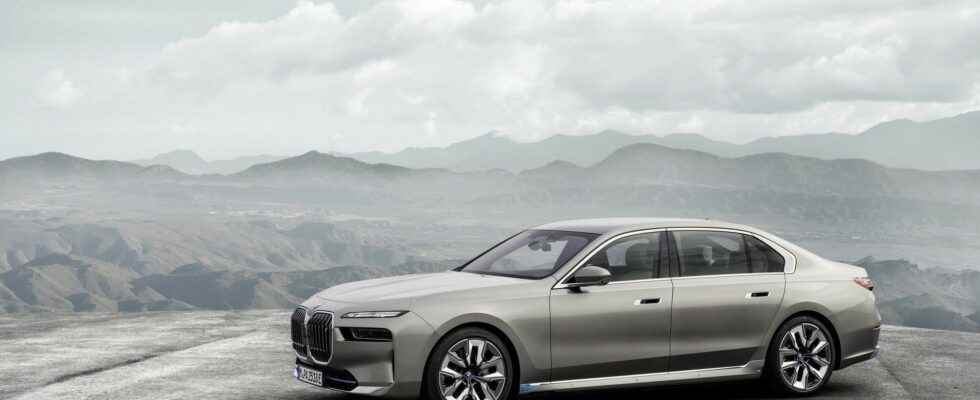BMW declines its flagship in electric. The newly announced 7 Series will have an electric counterpart, the i7. This comes to rest at the top of the manufacturer’s range with two targets in sight: the indestructible Model S, from Tesla, and more certainly the EQS from its historic rival Mercedes.
For its large sedan, BMW applies the same strategy as with the smaller, the i4. It consists of integrating an electric motor in a chassis and case identical to the thermal version.
Comfort in the front, cinema behind
The i7 is also an opportunity to unveil a new interior and give pride of place to new technologies. The renewed dashboard is based on two screens forming the same whole. The first of 12.7 inches is dedicated to the driver and is placed just behind the steering wheel.
The instrumentation screen provides essential driving information and can be slightly personalized. In the center, tilted slightly towards the driver, is the centerpiece of the cabin, a 15-inch screen dedicated to the infotainment system.
We will quickly pass on the heated, cooled, and even massaging seats of the i7 to focus on a singularity, at the rear this time. Indeed, rather than tablets placed on the front seats, BMW is considering the integration of a large screen housed in the roof sky which would unfold thanks to a mechanism to be placed at a good distance from the rear passengers.

An engine already known
The future i7 will not have the difficult task of inaugurating a new engine. Indeed, BMW has chosen to equip it with the same engine as the i4 M50. The i7 xDrive60 will therefore have a block of 400 kW (or 544 hp) that can develop a torque of 745 Nm. Despite its 2.7 tonnes on the scale, the engine has its effect and should make it possible to achieve the 0 to 100 km/h in just 4.7 seconds.

As for the battery, it is a lithium-ion pack integrated under the floor and displaying a useful capacity of 101.7 kWh. Accordingly, the range of the i7 should be between 590 and 625 km. These are the first figures announced by the manufacturer pending WLTP certification.
On the other hand, on the charging side, BMW has not sought to set new records. Its i7 displays 190 kW of charging power on a fast terminal. This is obviously interesting insofar as it will be possible to recover 170 km of autonomy in 10 minutes, but below what the top-of-the-range models from Mercedes, Audi and even Hyundai/Kia offer.
Also see video:
Also see video:
The BMW i7 will be marketed in November 2022, its price is, as expected, astronomical, since the model starts at 139,990 euros.
